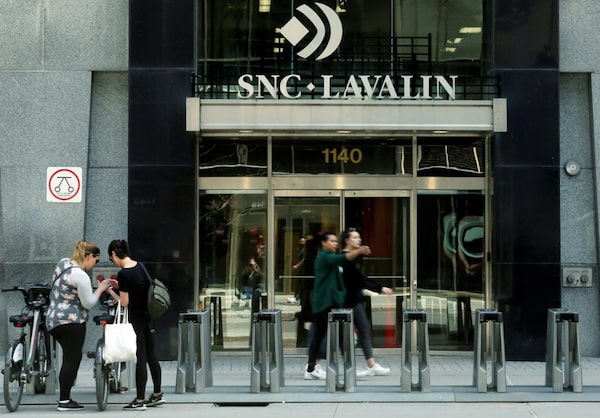
Pedestrians walk past a SNC-Lavalin company building in Montreal, May 5, 2019.DARIO AYALA/Reuters
SNC-Lavalin Group Inc.’s head of compliance says the Canadian engineering giant still hopes to reach an out-of-court settlement on bribery and fraud charges.
Hentie Dirker told an audience at a conference on bribery and economic crime in Vancouver on Wednesday that the company has long had the systems in place to prevent repeats of past corruption and bribery scandals, and reached similar settlements with other government agencies and international financial institutions that have proven effective. After detailing four such agreements, Mr. Dirker said SNC-Lavalin “could still get to” a deferred prosecution agreement (DPA) with federal prosecutors.
Last September, changes to the Canadian Criminal Code created the new legal tool, which allows a company to admit wrongdoing and pay a fine to avoid a trial and conviction.
“We were not invited [to negotiate a DPA] back in September or October, when it was first launched,” said Mr. Dirker, chief integrity officer at the company. “We still do not know why, but we’re still there and still open in terms of … that process.
“We’ve had quite a few settlements because what the company is trying to do is really to put the past behind us.”
Last month, a Quebec judge ruled that SNC-Lavalin can stand trial on bribery and fraud charges, keeping the Canadian engineering giant’s case in the public eye in the run-up to this fall’s federal election.
The RCMP laid the charges in February, 2015. Police and prosecutors allege the company paid at least $47.7-million in bribes to public officials in Libya between 2001 and 2011 to secure contracts from the regime of the late dictator Moammar Gadhafi while participating in a $130-million fraud.
The case sparked a political controversy for the federal Liberal government, which has come under fire over accusations Prime Minster Justin Trudeau’s staff applied inappropriate pressure on then-attorney-general Jody Wilson-Raybould to overturn prosecutors’ decision not to negotiate a DPA with the company.
In the political fallout, Ms. Wilson-Raybould resigned from cabinet, and Mr. Trudeau’s principal secretary, Gerald Butts, stepped down. Jane Philpott, widely regarded as one of Mr. Trudeau’s most competent ministers, resigned as Treasury Board president after the Prime Minister rejected the allegations of inappropriate pressure.
Mr. Dirker, who joined SNC-Lavalin in 2015 after working in compliance at Siemens AG, said the company has turfed any people involved in the scandals and criticized the recent media coverage.
“If you speak to anybody from a public perspective or anybody that reads a newspaper, they see a scrambled egg because a lot of times there is no timeline to all the issues and people get confused as to what has happened, when it happened and has it been happening that long,” he told about 80 anti-corruption and bribery experts at the TRACE International forum.
“Since 2012, we haven’t had any issues come up that relates to any source of bribery or corruption.”
Mr. Dirker said his company has adapted Siemens’s compliance regime over the past five years and is now being strictly monitored by the World Bank and the African Development Bank, two institutions with which it has reached agreements.
He also said similar agreements with the Quebec government and Public Works Canada have been successful, and the company still reports to them on its improvements to its compliance regime.
“That really allows us to continue doing business with the Canadian government on a federal level because, again, they did proper due diligence on us.”
With a report from Steven Chase